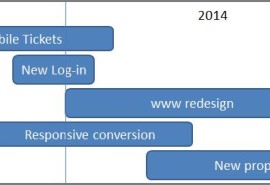When Do You Know It’s Time to Let an Employee Go?

I am working with a manager-level employee, let’s call him Bill, who has repeatedly missed his delivery deadlines. He has consistently taken months longer than promised to hire new people. He has consistently missed opportunities to put new tools and processes into place that would have prevented problems or allow us to move faster.
I know Bill is trying. He has been with the company for over ten years, has a family, and is desperately trying to do the right thing. There are reasonable explanations out there for the delays and misses.
All you have to work with is people. You may be surrounded by computers, or you may work with animals, plants, or bricks, but you won’t get too far in a business if you are no also working with people. And, if you want to make a difference, you need people to work with you who are heading in the same general direction. Even better if they are people who are enthusiastic about the direction, not just dragged along by it.
They say letting someone go is the toughest job a manager has. I think setting a compelling direction and aligning everyone to it is harder, but letting an employee go is a close second.
It doesn’t feel good to let someone go even if you manage to convince yourself that it will be the best thing for both of you. That may end up being true, but if most likely won’t be the case for months, maybe years. For the person you let go, there will most likely be money problems, family problems, and self-confidence problems.
All because of you. You have to take accountability for that. It’s personal. It’s like telling someone they are fat, lazy, and have bad breath in a conference room filled with people. It’s gonna hurt.
But, you have a business to run, and your business is run well or poorly by people. You have to make the decision who will go on that journey with you.
Now, you can draw up a specific map, a performance improvement plan, often required by Human Resources, and pray your employee gets religion.
My experience is that Performance Improvement Plans (PIP) never work. In fact, I think PIPs just give the employee more opportunity to not face the facts. Most PIPs provide pages of specific guidance on how to meet the bar (not go over it), which most employees who don’t want to decide what they really want to do in life will use as a play book and act it out accordingly. When the PIP period is over, so is the drama run on Broadway, and the employee slips back to their old habits.
So, how do you know when it’s time to say goodbye?
There is, of course, the data: The missed sales goals, the defects, the incorrect reports. But rarely, as managers, do we have such specific on or off metrics to guide our decisions.
Instead, I pay attention to ‘bad smells. They are just symptoms, of course, and not the cause. But the cause is usually not far away.
Bad Smell Number 1: Location. Where is your employee located most of the day? Are they with the team, the customers, or brainstorming with other partners, or are they holed up in their cube or office, doing emails or creating yet another pointless power point deck? If they are not visible to the rest of the team for most of the day, that’s a bad smell.
Bad Smell Number 2: Enthusiasm about your product or service. What are they saying about the product or service you are providing? Are they talking it up, brainstorming new ideas to make it better, or using it when there are other better alternatives available? Or, are they always finding fault with it, or using competitive products in the interest of ‘market research’? If your employee doesn’t have hope and ambition for your product or service, no matter how imperfect it currently is, that’s a bad smell.
Bad Smell Number 3: Growth. Does your employee frequently go to related conferences to learn the newest techniques or processes, take classes on improving their skills, or talk about events in the industry like they were parties they wished they could have attended? Or, does your employee say they’re always too busy to leave work to go to a conference or take a class? If so, that’s a bad smell.
With Bill, I’ve smelled all three of these Bad Smells, and many more. I won’t be able to let him go just based on these three anecdotal signs, of course, but they showed me I needed to put together a more formal case and discuss it with him directly. I have had multiple conversations with him about the hard facts and the ‘bad smells’, and it has been and will continue to be a heartbreaking reality for both of us. I have let him know he will not be progressing, and he should look for other work. Whether he finds the right fit or not, there will be an effect on him and his family. I will try to make the transition as quickly and fairly as possible.
I’d like to give you a 100 point checklist that will absolutely assure you that you are doing the right thing, but it doesn’t exist. You can only sense when your employee is not engaged with their teams, enjoying the product or service you provide, and growing, and when they are not. Give them that feedback, and if necessary, put them on a formal improvement plan.
If you smell smoke, you have to fairly, humanely, and with full accountability, say, ‘you’re fired.’
Related Posts
-
One of the odd behaviors with the current rage for Agile and...Oct 08, 2013 / 0 comments
-
It bums me out a bit how much scrum masters tend to stick wi...Oct 03, 2020 / 0 comments
-
This week I’ve been thinking about the projects I’ve wor...Dec 31, 2015 / 0 comments
Categories
Recent Posts
CONTACT INFO
Welcome to Coral Mountain Consulting, a Deliverse company. We are glad you found us. If you need to contact us, please call or email Barc directly.
Phone: 1-(626) 644-3857
Office: 2122 New York Drive, Altadena, CA 91001







